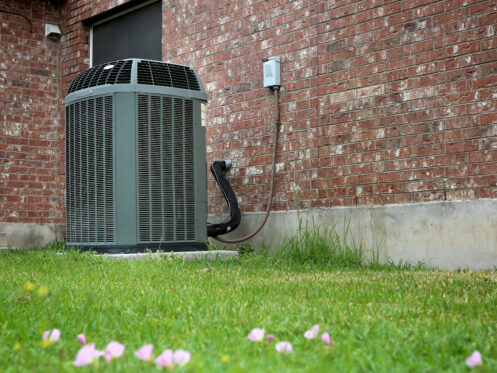Purchasing a new air conditioner is a significant yet daunting decision. This is not only due to the substantial upfront cost but also because the system you choose will likely serve you for the next 20 years (depending on the brand and model). Therefore, choosing the right air conditioner for your home is crucial to ensure maximum comfort and energy efficiency. Here are the key factors to consider.
The Type of Air Conditioner
Central Air Conditioning
Central air conditioners are ideal for people moving into a newly built home. They are termed “central” because they condition the entire house from a single, core location within your building. They use an extensive network of ducts and vents to circulate cool air to each room and are often combined with a furnace system for heating purposes.
Central air conditioning systems are cherished for their ability to cool an entire home evenly and the convenience of a single control panel for temperature regulation. They can also enhance a home’s market appeal. However, installation can be expensive, and regular maintenance is necessary to ensure optimal performance.
Split Air Conditioning
Split air conditioners are more versatile and suitable for homeowners who don’t want to cool their entire home at once. They consist of two main components: an outdoor unit that contains the compressor and condenser and an indoor unit that contains the evaporator. These two units are connected by a refrigerant line, allowing for flexible installation options.
Split air conditioners are relatively easy to install and can cool specific areas of your home, making them more energy-efficient than central air conditioning systems. They also come in different sizes and styles to match your home’s interior design. However, they are not as powerful as central air conditioners and may not be able to cool larger spaces effectively.
Window Air Conditioning
If you live in an apartment or a small home, window air conditioning units can be more cost-effective. These units are self-contained and installed directly into a window frame, eliminating the need for ductwork. They work by pulling warm air from the room, cooling it through a refrigerant, and releasing cool air back into the room.
Window units are popular because they are low-cost and easy to install. They are also relatively easy to maintain and can be removed during the colder months to save energy. However, they may not be suitable for larger spaces or homes with multiple rooms.
Portable Air Conditioning
Portable air conditioners are similar to window units in that they are self-contained and do not require ductwork. However, instead of being installed in a window, they can be moved from room to room as needed.
Portable air conditioners use a hose to exhaust hot air through a window or wall while bringing in fresh air from outside. They are a great option for renters or those who cannot install window units.
Understanding Your Home’s Cooling Needs
Selecting the right air conditioner involves more than just picking a type. You need to consider various factors that impact your home’s cooling needs. The key factors at play are as follows.
1. Your Home Size
A larger home requires an air conditioning unit with a higher cooling capacity to manage the temperature across all rooms adequately. Central air conditioning systems are often the best choice in this scenario. However, if you are looking to save as much energy as possible, consider zoning your home and using mini-split systems in specific areas.
2. Insulation
Homes with excellent insulation retain conditioned air better. If your home is poorly insulated, you may need a more robust system or additional insulation improvements to maintain a comfortable temperature.
3. Sun Exposure
If your home has large windows or receives a lot of direct sunlight, your air conditioner will need a little more effort to keep it cool. In this case, you may want to consider a system with a higher cooling capacity. On the other hand, if your home is naturally shaded or receives very little direct sunlight, you may be able to get by with a smaller, more energy-efficient system.
4. Number of Occupants
If you live alone or with just one other person, a zoned split system could be ideal for your needs. You only need to condition the areas of the house that are in use. However, if you have a large family or frequent guests, central air conditioning might be a better option.
5. Ceiling Height
Rooms with high ceilings require more cooling capacity as the volume of air to be cooled increases. If this is the case for you, you may also want to consider installing a ceiling fan to help circulate the cool air and reduce your reliance on the AC.
6. Existing Ductwork
If you already have ductwork installed, a central air conditioning system might be more convenient and cost-effective. However, if your home does not have ductwork or needs significant repairs or modifications, a zoned mini-split system may be the better choice.
7. Future Expansion
Consider any future renovations or expansions that might affect your cooling needs. It’s easier to install a system that can handle future demands than to upgrade later.
Calculating the Right Size of Your AC
When shopping for a new air conditioner, you need to find just the perfect size for your home. If you get one that’s too big, it will power up and down more times throughout the day than it should. This frequent cycling can cause wear and tear on your system and lead to higher energy bills. On the other hand, an AC that’s too small will be overworked, running constantly and struggling to keep up with your cooling demands. Again, this will cause it to age way before its time and also lead to higher energy bills.
To determine the appropriate AC size, consult a professional HVAC contractor. The process typically involves several steps. First, the contractor will measure the square footage of the area that needs cooling. Next, they will determine the necessary cooling capacity, measured in British thermal units (BTUs), by multiplying the square footage by 20 BTUs. ACs generally need about 20 BTUs per square foot.
But square footage isn’t the only factor to consider. The contractor must also adjust for the aforementioned cooling needs, such as ceiling height, insulation type, and sun exposure levels.
Efficiency Ratings
SEER Ratings
The Seasonal Energy Efficiency Ratio (SEER) measures the cooling output of an air conditioner compared to its energy consumption over a typical cooling season. The higher the SEER rating, the more energy-efficient the unit is. The minimum SEER rating required by the U.S. Department of Energy for residential air conditioners is 14, but some units can have SEER ratings as high as 25.
ENERGY STAR Certification
To encourage homeowners to choose energy-efficient models, the Environmental Protection Agency (EPA) introduced the ENERGY STAR program in partnership with the Department of Energy. An AC can earn an ENERGY STAR certification by meeting strict energy efficiency guidelines set by these two agencies. These include having a SEER rating of at least 15, and it may even qualify for tax rebates or incentives.
Budget Considerations
Initial Cost
The initial cost varies widely depending on the type and size of the unit. Central air conditioning and mini-split systems generally have higher upfront costs than window units and portable air conditioners.
Recurring Expenses
In addition to the initial cost, there are ongoing costs to consider, such as energy consumption and maintenance. While more efficient AC units may have a higher upfront cost, they can save money in the long run through lower utility bills.
Consult John Henry's Plumbing, Heating, Air, and Electrical for More Information
Choosing the right air conditioner for your home is a multifaceted decision that requires expert guidance and consideration of various factors. So, if you live in Lincoln, Omaha, and surrounding areas, call John Henry's Plumbing, Heating, Air, and Electrical for a professional assessment and installation. We can also help with all types of electrical, plumbing, and drainage needs if needed to provide you with a seamless experience with your new air conditioning unit.

